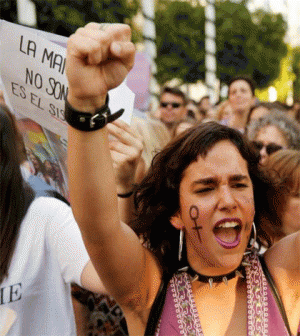- Finding Unshakable Power in a World That Wants to Pull Us ApartPosted 5 months ago
- What could a Donald Trump presidency mean for abortion rights?Posted 5 months ago
- Financial Empowerment: The Game-Changer for Women in Relationships and BeyondPosted 6 months ago
- Mental Health and Wellbeing Tips During and After PregnancyPosted 6 months ago
- Fall Renewal: Step outside your Comfort Zone & Experience Vibrant ChangePosted 6 months ago
- Women Entrepreneurs Need Support SystemsPosted 6 months ago
Still no justice, says Spanish woman a decade after daughter killed in Pamplona

By Catherine MacDonald and Isla Binnie | Thomson Reuters Foundation
Pamplona has been cracking down for several years on sexual abuse at the festival, and now offers specialised support teams and an app with a localisation tool to report assaults.
IRUN, Spain, July 6 (Reuters) – A decade has passed since her daughter was beaten and strangled to death at Pamplona’s annual bull-running festival, but Asuncion Casasola says there is still no justice for women affected by violence in Spain.
The man who beat her daughter 36 times and broke her skull was later convicted of manslaughter, an example of what campaigners say is excessive leniency towards perpetrators of sex crimes and deep-rooted gender inequality in the Spanish judicial system.
This year’s festival kicks off with fireworks on Friday under the shadow of another controversial ruling in a case of assault on another woman.
Casasola had hoped justice had toughened up in the decade since Nagore’s death, but received a blow this year when five men who called themselves “The Wolf Pack” were cleared of raping an 18-year-old woman at the festival in 2016.
“I needed to believe in justice, I needed to think that things had changed,” Casasola said. “I heard all that nonsense and I was shocked. I don’t think there is any justice.”
The Wolf Pack were found guilty of the lesser crime of sexual abuse, prompting mass protests. It also shone an uncomfortable spotlight on Pamplona’s alcohol-fuelled week-long festivities.
The men’s release on bail last month sparked renewed outrage, putting pressure on the new Socialist government of Prime Minister Pedro Sanchez to back up his appointment of a female-dominated cabinet with concrete measures like reviewing the definition of sex crimes in the penal code, and training judges in gender issues.
“I don’t care who is in government, they need to get their act together. They cannot leave women defenceless,” Casasola said, speaking in Nagore’s bedroom in Irun, near Pamplona, which is still as the student nurse left it.
Jurors in the trial of Nagore’s killer asked whether the young woman was a flirt, and Casasola saw the Wolf Pack trial as similarly looking to judge the behaviour of the victim.
Pamplona has been cracking down for several years on sexual abuse at the festival, and now offers specialised support teams and an app with a localisation tool to report assaults.
Fewer incidents of sexual violence are reported in Spain than in many other European countries, but the number has risen in recent years, and cases of domestic violence hit a five-year high in 2017.
Some activists have suggested commemorating the Wolf Pack case by wearing black for Friday’s opening ceremony in place of the traditional white with a red neckerchief, but local feminist groups oppose this, as does Casasola:
“Women need to go to Pamplona, have fun and wear the same outfit as always.”
(Reporting by Catherine Macdonald and Isla Binnie Editing by Raissa Kasolowsky)
Our Standards: The Thomson Reuters Trust Principles.






